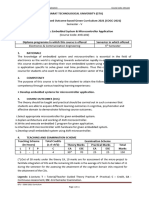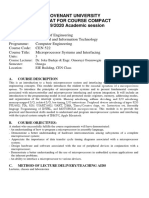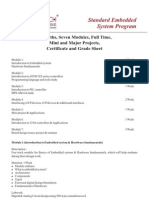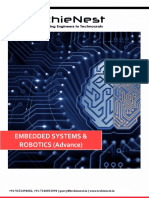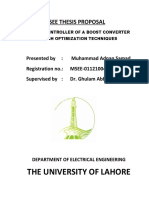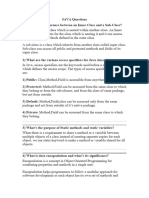New Microprocessor Theory Course Outline
Uploaded by
usmanzahidNew Microprocessor Theory Course Outline
Uploaded by
usmanzahidThe University of Lahore
Department of Technology
Course: TEE 3011 Microprocessor Theory & Interfacing
Semester Winter 2018
Instructor: Assistant Professor: Syed M Hamedoon
Office: Tech Building, Faculty room 1 b
Email: Muhammad. Hamedoon@tech.uol.edu.pk
Phone: 03244575785
Office Hours: Monday 12:00 – 02:00
Tuesday 10:00 - 11:00
Thursday 09:00 – 11:00
Outside the above office hours students are advised to get appointment.
Textbook: The 8051 Microcontroller and Embedded Systems Using Assembly and C. 4th edition By:
Muhammad Ali Mazidi
Rules and Regulations
1. Every student enrolled in this is expected to attend all lectures. For this purpose, university
regulations governing attendance will be enforced. Only official excuses submitted within one
week of the occurrence of absence acceptable.
2. Homework assignments are listed in the table below and will NOT be collected. HW solutions
will be posted. Quizzes on the same material of the homework assignment will be given one
week after the posting of the HW solution. The date of the class quizzes will be announced in the
class as well as on the noticeboard at least a week prior to the quiz date.
3. All quizzes are counted towards your final grade. NO MAKEUP QUIZZES WILL BE GIVEN
FOR ANY REASON. If you have an OFFICIAL excuse for missing a quiz, your quiz grade will
be based on your FINAL EXAM result.
4. Cheating in quizzes, exams, or the final exam will result in the grade of F in the course.
5. Major Examinations will be coordinated with the other sections.
Grading Policy:
Class Work: 20% (10% Quizzes, 10% Assignment)
Laboratory: 20%;
Midterm Exams : 20%
Final Exam: 40%
Total = 100
Text Book and Other Reading Material
Several excellent books are available and the material taught in this course will be derived from a
number of books. However, Probability, Random Variables and Stochastic Processes will be used as
a guide.
1. Muhammad Ali Mazidi , The 8051 Microcontroller and Embedded Systems Using Assembly
and C, 4th Ed.
2. Class Notes, which will be given out from time to time.
3. I. Scott Mackenzie,The 8051 Microcontroller, 3rd Edition
4. Dogan Ibrahim , Microcontroller Projects in C for the 8051
5. David E. Simon, An Embedded Software Primer.
COURSE OBJECTIVES:
When this course is completed students will be able to understand
1. To learn microprocessor architecture, its instructions and addressing modes,
microprocessor I/O, interfacing peripherals, assembly/C language programming and
debugging methodology.
2. To learn the use of data transmission including parallel communication with and
without handshaking and serial protocols (UART and USART), data acquisition,
transmission and timing sequence.
3. Learn to write and debug structured assembly language programs to implement
computational and control algorithms.
4. Learn to program efficiently keeping in eye the time and space constraints of the
microcontroller.
5. Learning to program and identify the type of interrupt required to handle specific
critical problem.
6. Learning the use of microcontroller’s internal timers and counters, and identifying the
type according to the problem i.e. simple or timer interrupt.
7. To learn good practices in structuring a microprocessor control program i.e. applying
top down, bottom up or functional programming model to cater the specified needs of
the problem.
8. Learning to interface and use analog to digital and digital to analog converters.
9. Learning to drive simple loads and inductive loads such as motors, relays, solenoids
etc.
10. Learning the use of software necessary to design, implement, test, debug and simulate
embedded systems.
11. To understand and recognize the constraints facing embedded system designer and
determine how to access them.
12. To develop a program in microcontroller using quick and efficient methods
13. To program a controller in assembly and C language and operate its peripherals
devices
14. To predict, measure and manipulate a program execution time
15. To provide brief understanding about embedded system and its peripherals
COURSE OUTCOMES:
By the end of the course students will become thoroughly familiar with the elements of
microprocessor software and hardware. They will be able to:
1. Use technical knowledge including microprocessor architecture, its instructions and
addressing modes, microprocessor I /O interface and peripherals, assembly/C
language programming and debugging methodology.
2. Demonstrate the fundamental understanding of data transfer, synchronization, and
timing diagrams.
3. Describe the architecture of microprocessors and identify the key components and
development tools of microprocessor based systems.
4. Write and debug structured assembly language programs to implement computational
and control algorithms.
5. Apply C language to demonstrate the high-level language’s capability of interfacing
the microcontroller.
6. Employ interrupt techniques to handle system exceptions.
7. Manipulate event counting and timing in microcontrollers.
8. Evaluate serial communications with peripheral interfacing under different
configurations.
9. Perform the efficient operations on analog signals using analog interfaces and
peripherals.
10. Use design tools and related resources including microprocessor hardware and
software, microprocessor peripherals, assemblers, C compilers, monitor and simulator
programs.
11. Understand the types and methods to make their own drivers or use commercially
available drivers to drive inductive loads like DC motors, stepper motors, relays,
solenoid coils etc.
12. Design a self sufficient efficient embedded system of commercial importance or
industrial usage.
13. Learning the engineering issues including the hardware consideration and power
consumption calculations for designing systems with efficient power usage especially
where backup batteries or solar powered systems are required.
14. To understand and to apply design methodologies for embedded systems
15. To be familiar with modern hardware/software tools for building prototypes of
embedded systems
Course weekly Outline
Wk Subject Lecture detail Lab Detail
Introduction, purpose and student outcomes Notes Exp1 . Introduction to
that are expected in the course. Embedded system and
Number and coding systems, digital primer trainer
1
and inside working of a general purpose
computing machine.
Chapter 0; Text Book
Exp 2. Microcontroller
programming using Keil
Microcontrollers and embedded processors. Chapter 1; Text Book micro vision software
Overview of the 8051 family.
2
Intro to assembly programming.
Special Registers and Architecture of 8051 Chapter 2; Text Book
Steps involved in assembling and execution
of a program.
Data types and their uses. Exp 3. To implement
Chapter 2; Text Book assembly programming
Directives and their effect on programs.
3 in 8051 microcontroller
Concept of data transfer and program
8051 Flag bits.
Program Status Word Register.
Conditional and Unconditional Looping Exp 4. LED Binary
Structures. counter
Chapter 3; Text Book
4 Call Instructions.
Delay generating concepts.
Time Delay Calculations for various chips.
8051 available ports description.
Special purpose of port 0, 2 and 3.
Exp 5.LED chasing circuit
Internal working of microcontrollers pins.
Chapter 4; Text Book
Calculating value for pull up resisters.
5 Ports and bit addressability.
Initial conditions of controller pins upon
reset.
Reading Input and reading Latch
Difference.
Immediate, register, direct, indirect, register
indirect and indexed addressing modes with
example programs.
Signed and unsigned number concepts
Chapter 5; Text Book
Role of OV flag in signed numbers. Exp 6. Cyclic LED pattern
6 Logical and comparison instructions.
Rotations with and without carry.
Advantages and disadvantages of
programming in C language.
Chapter 7; Text Book
Data types and time delays.
Choosing a variable data type and their
effects on memory.
ASCII to BCD and BCD to ASCII
conversions using logic instructions. Chapter 7; Text Exp 7. LED Dice
7 Concept of the checksum byte for checking Book
integrity of data.
Concept of implementing Soft Serial Port
Exp 8. Two digit decimal
8 Mid Exam counter
Basic concept of Timer.
Register settings of Timers.
Timer modes, 16 bit and 8bit auto reload
mode. Chapter 9; Text Book
9 Timer Programming Modes and their
Exp 9. Seven segment
usages.
display driver
Generating waves of specific frequencies.
Concept of negative values in timers.
Pulse width modulation using timers
Counter programming Basics.
Modes of counter operation,8bit&16bit
mode. Chapter 9; Text Book
10 Design problems related to timers and
counters. Exp 10. Simple buzzer
Basics of serial communication protocols. Chapter 10; Text interface using
Data transfer rates. Book microcontroller
Serial communication drivers.
Serial communication protocols, Exp 11. Small speaker
UART,USART etc interface using timer
Serial com register settings and baud rate Chapter 10; Text interrupt
11 selection. Book
Design problems related to the application
of serial programming.
Serial port programming in C. Chapter 10; Text
Hard serial versus soft serial. Exp 12. Controlling
Book
stepper motor using
Hardware considerations and design
12 microcontroller
problems continued.
Interrupt versus polling.
Steps involved in interrupt execution.
Interrupts available in 8051. Chapter 11; Text
Interrupt Enable register features and Book
settings.
Exp 13. Serial
communication between
Programming and using timer interrupts. PC and microcontroller
Timer interrupts use scenarios and design
problems.
Types of hardware interrupts and their
13 settings.
Programming and using hardware Chapter 11; Text
interrupts. Book
Design problem related to the use of
hardware interrupt.
Basics, theory and interfacing with
microcontroller.
ADC basic Chapter 12; Text Exp 14. Timer
14
Basics, theory and interfacing with Book Programming
microcontroller.
Intro to control theory.
DC motors, Stepper motors, servo motors.
Speed control, precision control, Hardware Exp 15. LCD Interfacing
considerations and integration challenges. using 8051
15 Temperature Sensors.Proximity Sensors. Notes
Reed Switch.Intro to RTC etc
Issues related in embedded system
development.
Providing Isolation to system.
Load calculations and recommending Exp 16. Interfacing of
16 battery rating. Notes Analog to
digital ,converter (ADC),
Analog temperature with
Introduction to state space approach. micro controller
Final Exam Lab Exam
5|Page
You might also like
- Microprocessor Applications and InterfacingNo ratings yetMicroprocessor Applications and Interfacing4 pages
- Syllabus 5th Semester EE 24112022 RemovedNo ratings yetSyllabus 5th Semester EE 24112022 Removed19 pages
- Top Microcontroller Interview Questions and Answers - SimplilearnNo ratings yetTop Microcontroller Interview Questions and Answers - Simplilearn6 pages
- Government Polytechnic, Nagpur. Course Curriculum: Teaching SchemeNo ratings yetGovernment Polytechnic, Nagpur. Course Curriculum: Teaching Scheme41 pages
- BTEL13501 Microprocessor and Microcontroller Sem5 Final NVS DBNo ratings yetBTEL13501 Microprocessor and Microcontroller Sem5 Final NVS DB4 pages
- Ec302T Microprocessor and MicrocontrollerNo ratings yetEc302T Microprocessor and Microcontroller6 pages
- Course Objectives:: L T P/S SW/F W Total Credit UnitsNo ratings yetCourse Objectives:: L T P/S SW/F W Total Credit Units4 pages
- Microcontroller & Embedded Systems ScheduleNo ratings yetMicrocontroller & Embedded Systems Schedule3 pages
- Programmable Logic Controllers (PLC) EEE220 PDF100% (1)Programmable Logic Controllers (PLC) EEE220 PDF7 pages
- Faculty of Electrical Engineering: Program OutcomesNo ratings yetFaculty of Electrical Engineering: Program Outcomes3 pages
- BECE320E_EMBEDDED-C-PROGRAMMING_ETH_1.0_0_BECE320ENo ratings yetBECE320E_EMBEDDED-C-PROGRAMMING_ETH_1.0_0_BECE320E2 pages
- 22EECF202 Microcontroller Architecture and Programming 2024 25 ODD Final V1 (2)No ratings yet22EECF202 Microcontroller Architecture and Programming 2024 25 ODD Final V1 (2)25 pages
- EC305 Microprocessors and MicrocontrollersS5-EC-Syllabus PDFNo ratings yetEC305 Microprocessors and MicrocontrollersS5-EC-Syllabus PDF3 pages
- MicroP and Embedded Notes (Loan Sir) (1)No ratings yetMicroP and Embedded Notes (Loan Sir) (1)159 pages
- Embedded System & Microcontroller Application Course Code: 4351102No ratings yetEmbedded System & Microcontroller Application Course Code: 43511028 pages
- Tybsc - Physics Applied Component Computer Science 1No ratings yetTybsc - Physics Applied Component Computer Science 112 pages
- Development and Use of Multi-Module 8051No ratings yetDevelopment and Use of Multi-Module 80516 pages
- Square and Find 2's Complement of A NumberNo ratings yetSquare and Find 2's Complement of A Number1 page
- Microcontrollers 8051-Notes For IV Sem StudentsNo ratings yetMicrocontrollers 8051-Notes For IV Sem Students60 pages
- Microcontroller Theory and Interfacing OBENo ratings yetMicrocontroller Theory and Interfacing OBE4 pages
- Module 1 - Introduction - Microcontroller 8051 - EE6603 - v1No ratings yetModule 1 - Introduction - Microcontroller 8051 - EE6603 - v137 pages
- BECE204L_MICROPROCESSORS-AND-MICROCONTROLLERS_TH_1.0_0_BECE204LNo ratings yetBECE204L_MICROPROCESSORS-AND-MICROCONTROLLERS_TH_1.0_0_BECE204L3 pages
- Legends: L-Lecture T - Tutorial/Teacher Guided Theory Practice P - Practical C - Credit, ESE - EndNo ratings yetLegends: L-Lecture T - Tutorial/Teacher Guided Theory Practice P - Practical C - Credit, ESE - End6 pages
- Embedded Systems Programming with C: Writing Code for MicrocontrollersFrom EverandEmbedded Systems Programming with C: Writing Code for MicrocontrollersNo ratings yet
- Digital Electronics with Arduino: Learn How To Work With Digital Electronics And MicroControllersFrom EverandDigital Electronics with Arduino: Learn How To Work With Digital Electronics And MicroControllers5/5 (1)
- 1-Format of Industrial Training AssessmentNo ratings yet1-Format of Industrial Training Assessment1 page
- OBE Based Industrial Drives and PLC Lab Manual Usman100% (1)OBE Based Industrial Drives and PLC Lab Manual Usman93 pages
- M. SC Thesis Proposal (Revised) : The University of LahoreNo ratings yetM. SC Thesis Proposal (Revised) : The University of Lahore16 pages
- Control of Hydraulic Pulse System Based On The PLCand State Machine ProgrammingNo ratings yetControl of Hydraulic Pulse System Based On The PLCand State Machine Programming10 pages
- Prefix To Infix Conversion: Data StructureNo ratings yetPrefix To Infix Conversion: Data Structure5 pages
- Lab 04: Basics of Javascript: Sel-310 Web Engineering LabNo ratings yetLab 04: Basics of Javascript: Sel-310 Web Engineering Lab8 pages
- No Section Taken From The Software Requirement Document The Requirement FactorsNo ratings yetNo Section Taken From The Software Requirement Document The Requirement Factors3 pages
- all.preinstalled-system-common.apps.on.vanillaOSafter.Windex0% (1)all.preinstalled-system-common.apps.on.vanillaOSafter.Windex4 pages
- Computer Science and Information Technology (Csc. 153)No ratings yetComputer Science and Information Technology (Csc. 153)6 pages
- NET201 Lab Experiment # 2 - Configuring and Troubleshooting VLANs and TrunkingNo ratings yetNET201 Lab Experiment # 2 - Configuring and Troubleshooting VLANs and Trunking23 pages
- Smart Diary/Planner Smart Diary/Planner Pro: Plan On Paper, Get Organized On ScreenNo ratings yetSmart Diary/Planner Smart Diary/Planner Pro: Plan On Paper, Get Organized On Screen2 pages
- Jdegt - Selectdata/ Jdegt - Selectdatakeystr: SyntaxNo ratings yetJdegt - Selectdata/ Jdegt - Selectdatakeystr: Syntax4 pages
- Top Microcontroller Interview Questions and Answers - SimplilearnTop Microcontroller Interview Questions and Answers - Simplilearn
- Government Polytechnic, Nagpur. Course Curriculum: Teaching SchemeGovernment Polytechnic, Nagpur. Course Curriculum: Teaching Scheme
- BTEL13501 Microprocessor and Microcontroller Sem5 Final NVS DBBTEL13501 Microprocessor and Microcontroller Sem5 Final NVS DB
- Course Objectives:: L T P/S SW/F W Total Credit UnitsCourse Objectives:: L T P/S SW/F W Total Credit Units
- Faculty of Electrical Engineering: Program OutcomesFaculty of Electrical Engineering: Program Outcomes
- BECE320E_EMBEDDED-C-PROGRAMMING_ETH_1.0_0_BECE320EBECE320E_EMBEDDED-C-PROGRAMMING_ETH_1.0_0_BECE320E
- 22EECF202 Microcontroller Architecture and Programming 2024 25 ODD Final V1 (2)22EECF202 Microcontroller Architecture and Programming 2024 25 ODD Final V1 (2)
- EC305 Microprocessors and MicrocontrollersS5-EC-Syllabus PDFEC305 Microprocessors and MicrocontrollersS5-EC-Syllabus PDF
- Embedded System & Microcontroller Application Course Code: 4351102Embedded System & Microcontroller Application Course Code: 4351102
- Tybsc - Physics Applied Component Computer Science 1Tybsc - Physics Applied Component Computer Science 1
- Module 1 - Introduction - Microcontroller 8051 - EE6603 - v1Module 1 - Introduction - Microcontroller 8051 - EE6603 - v1
- BECE204L_MICROPROCESSORS-AND-MICROCONTROLLERS_TH_1.0_0_BECE204LBECE204L_MICROPROCESSORS-AND-MICROCONTROLLERS_TH_1.0_0_BECE204L
- Legends: L-Lecture T - Tutorial/Teacher Guided Theory Practice P - Practical C - Credit, ESE - EndLegends: L-Lecture T - Tutorial/Teacher Guided Theory Practice P - Practical C - Credit, ESE - End
- Embedded Systems Programming with C: Writing Code for MicrocontrollersFrom EverandEmbedded Systems Programming with C: Writing Code for Microcontrollers
- Digital Electronics with Arduino: Learn How To Work With Digital Electronics And MicroControllersFrom EverandDigital Electronics with Arduino: Learn How To Work With Digital Electronics And MicroControllers
- OBE Based Industrial Drives and PLC Lab Manual UsmanOBE Based Industrial Drives and PLC Lab Manual Usman
- M. SC Thesis Proposal (Revised) : The University of LahoreM. SC Thesis Proposal (Revised) : The University of Lahore
- Control of Hydraulic Pulse System Based On The PLCand State Machine ProgrammingControl of Hydraulic Pulse System Based On The PLCand State Machine Programming
- Lab 04: Basics of Javascript: Sel-310 Web Engineering LabLab 04: Basics of Javascript: Sel-310 Web Engineering Lab
- No Section Taken From The Software Requirement Document The Requirement FactorsNo Section Taken From The Software Requirement Document The Requirement Factors
- all.preinstalled-system-common.apps.on.vanillaOSafter.Windexall.preinstalled-system-common.apps.on.vanillaOSafter.Windex
- Computer Science and Information Technology (Csc. 153)Computer Science and Information Technology (Csc. 153)
- NET201 Lab Experiment # 2 - Configuring and Troubleshooting VLANs and TrunkingNET201 Lab Experiment # 2 - Configuring and Troubleshooting VLANs and Trunking
- Smart Diary/Planner Smart Diary/Planner Pro: Plan On Paper, Get Organized On ScreenSmart Diary/Planner Smart Diary/Planner Pro: Plan On Paper, Get Organized On Screen
- Jdegt - Selectdata/ Jdegt - Selectdatakeystr: SyntaxJdegt - Selectdata/ Jdegt - Selectdatakeystr: Syntax





























